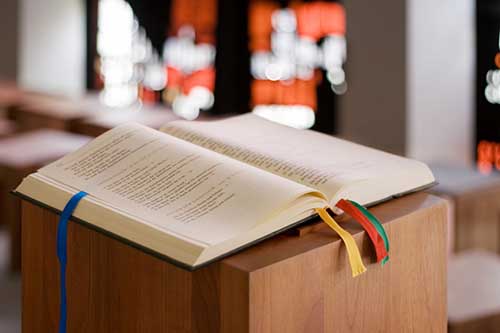
On this site, we have been having an energetic discussion on whether we can disagree with any parts of the Bible or not:
Disagreeing With The Bible Part 1
Disagreeing With The Bible Part 2
Disagreeing with The Bible Part 3
At heart, is the question of how we use the Bible. How can we hold to the Bible being inspired, and not follow every detail within it? Some, of course, answer this by saying everything is word-for-word dictated by God (including, some would have, translations – all the way to the King James Bible) and so we must follow every detail within it. Others see the Bible as the word of God in the words of it’s human authors, excusing the Bible’s imperfections because the latter are imperfect. Or they describe the Bible as a reliable account of God’s action in history. As is so often the case with things, no model adequately covers every aspect of living with the Bible I love, the Bible that inspires and drives my life, the Bible that gives words to that spirituality.
I previously worked on a series to reflect on nuancing “The Bible says”. I encourage you to engage with this series:
1) Textual Criticism
2) The Septuagint (LXX)
3) Hebrew vowel pointing
4) The canon
5) Translation
6) Continuity problems
7) Social Cultural Historical Geographic context
8) The Bible says 8
If you appreciated this post, do remember to like the liturgy facebook page, use the RSS feed, and sign up for a not-very-often email, …




It seems to me that the protesting 16th Century reformers, in their noble efforts to reform a Church desperately in need of reform (which remains true today), unfortunately threw out the great Catholic (and Rabbinic) tradition.
Looking around for an alternative source of authority, they seem to have placed a weight of authority on the bible beyond what it was every intended, or able, to bear.
The consequences appear to be the modern trends to literal fundamentalism or liberal “I disagree with the bible”.
I don’t think either approach is very helpful.
I find the idea that no model covers all the bases very helpful. It reminds me of Cardinal Avery Dulles SJ book on models of the Church.
We are a pilgrim Church on a holy journey. We haven’t worked everything out yet. There is more work to do in this area, as Pope Benedict pointed out in Verbum Domini in his comments on biblical inerrancy.
http://w2.vatican.va/content/benedict-xvi/en/apost_exhortations/documents/hf_ben-xvi_exh_20100930_verbum-domini.html
Many Blessings
Thanks, Chris. I haven’t read Verbum Domini – I will put it on the “to do” list as I’m extra busy currently. I was helped by an Orthodox priest saying you need a hammer to build a house, but a hammer isn’t sufficient to build the house. This is where sola scriptura falls down IMO. Blessings.
Also there is another level here Bosco, maybe the most important: does my life, do my my deeds, represent Jesus?
I developed severe PTSD after the latest d8saster and over and over now I ask myself, am I a bad person?
Yes, Tracy. I absolutely agree. And this, expressed slightly differently, is one of the points I am working towards in my series.
And from my e-knowing you, you are not a bad person [and sorry about the PTSD]. Even so, I say from time to time: the good news is – I’m not OK; You’re not OK; and that’s OK.
Blessings.
I’ve been doing Matthew 25, visiting the sick and dying.
We are all imperfect. Got it. Thanks Bosco.
Check out on utube, veritable forum for a good talk on this subject